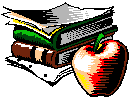 Rethinking
The Academy:
Rethinking
The Academy: Rethinking
The Academy:
Rethinking
The Academy:One of the best description of this new radical paradigm (one in which knowledge and knowledge-making shift to meet the needs of the moment and in which there need be no permanence) is from Jerome McGann's Radiant Textuality:
There are other ways to think about computerization as an aid to critical practise [sic] and reflection. First, unlike paper-based forms, electronic texts are more volatile and open-ended. This means that the "work-in-progress" becomes a defining mode for scholarly writing. Of course scholarship and criticism, like art, is a long journey, but the hypothetical structure of knowledge -- knowledge as a continual pursuit rather than an achieved condition -- gets increased emphasis through these new forms of study and expression.
Second, the cumulative nature of critical and scholarly work can be preserved and self-integrated in ways that far transcend the capabilities of paper-based instruments. Computerization not only vastly increases the amount of accessible information, it enables much greater flexibility in the ways information can be shaped, scaled, and negotiated. This doesn't mean that hierarchies of knowledge will be eliminated, as has been sometimes hoped and sometimes feared. Rather, it means that hierarchies can be determined and need not be determinate. Knowledge can be critically ordered for specific and conscious ends. Under such conditions, what is recondite and what is important, or what is central and what is peripheral, emerge as functions of the critical activity itself and need not stand as given horizons of thought.
Such formal flexibility defines what has been called the "interactive" character of knowledge pursued in a networked frame of reference. The environment is not so much a "readerly" as a "writerly" one: writer engagement rather than reader response. As such, it must also be engaged in far more self-consciously collaborative ways.
Last Modified: August 2, 1996
Copyright © 1996 by Keith Dorwick